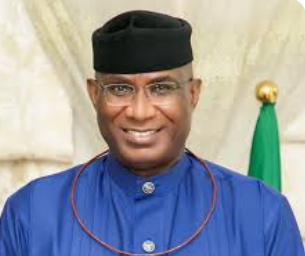The Nigerian Boxing Federation (NBF) finds itself embroiled in a deepening crisis, with its interim president, Azania Omo-Agege, launching a multifaceted legal challenge against key figures and organizations involved in the sport’s administration. The lawsuit, filed at the Federal High Court in Abuja, targets Kenneth Minimah, the disputed NBF president, the Nigeria Olympic Committee (NOC), the National Sports Commission (NSC), the International Olympic Committee (IOC), World Boxing, and the NBF Board. At the heart of the legal battle lies the controversial affiliation of the NBF with World Boxing, a move that Omo-Agege contends was executed without due process and in violation of the NBF’s established Articles of Association. This unauthorized alignment, according to Omo-Agege, further complicates the NBF’s existing membership with the International Boxing Association (IBA), creating a dual affiliation that lacks legal and procedural grounding.
Omo-Agege’s lawsuit underscores several key points of contention within the NBF. Primarily, he contests Minimah’s continued claim to the presidency, asserting that his tenure has expired and that his subsequent suspension by the IBA renders his position invalid. Omo-Agege asserts his own legitimacy as the interim president, arguing that he rightfully assumed the role following the expiration of Minimah’s term and according to the NBF’s established succession procedures. Furthermore, he challenges the legality of a November 2023 meeting which resulted in his own suspension, deeming the meeting and its outcomes null and void. This chain of events, as depicted by Omo-Agege, showcases a struggle for control over the NBF, raising questions about the legitimacy of leadership and decision-making processes within the organization.
The lawsuit also sheds light on the alleged external pressures influencing the NBF’s affiliation with World Boxing. Omo-Agege claims the IOC, acting through the NOC, exerted pressure on African boxing federations to switch their allegiance from the IBA to World Boxing. This alleged mandate, according to the lawsuit, created a coercive environment where national federations felt compelled to align with World Boxing, potentially disregarding their own internal procedures and existing affiliations. This claim points to a broader power struggle within international boxing, with the IOC and World Boxing seemingly vying for dominance over national federations and, by extension, the sport itself.
Beyond leadership disputes and affiliation controversies, Omo-Agege’s lawsuit delves into allegations of financial impropriety. The suit accuses Minimah and Akinyele Oladapo, another defendant, of mismanaging NBF funds, citing instances of partial payment of athletes’ allowances and the diversion of funds to private accounts. These financial irregularities, as alleged, paint a picture of mismanagement within the NBF, further compounding the organization’s administrative and leadership challenges. The combination of governance disputes and financial misconduct allegations raises serious concerns about the NBF’s overall operational integrity, potentially jeopardizing the development and support of Nigerian boxers.
Supporting Omo-Agege’s claim to the interim presidency is the African Boxing Confederation’s (AFBC) official lifting of his suspension. A letter from the AFBC Interim Secretary General confirms the decision, made during a board meeting, to reinstate Omo-Agege with immediate effect. This reinstatement seemingly strengthens Omo-Agege’s legal standing and reinforces his argument against the validity of his suspension by the disputed NBF leadership. The AFBC’s decision adds another layer of complexity to the situation, with a continental governing body recognizing Omo-Agege’s leadership while a faction within the NBF disputes it. This external validation of Omo-Agege’s position likely bolsters his legal challenge against Minimah and other defendants.
The ongoing legal battle within the NBF has significant implications for Nigerian boxing. The factional leadership and administrative turmoil have negatively impacted athletes’ preparation and performance in international competitions. The instability and uncertainty surrounding the NBF’s leadership create a challenging environment for athletes trying to focus on training and competition. The allegations of financial mismanagement further exacerbate the situation, potentially depriving athletes of necessary resources and support. This internal strife undermines the NBF’s capacity to effectively develop and promote boxing talent, jeopardizing the future of the sport in Nigeria. The legal proceedings, while aiming to resolve the dispute, also threaten to prolong the instability and further hinder the progress of Nigerian boxers. The outcome of the lawsuit will be crucial in determining the future direction of the NBF and the welfare of the athletes it represents.


